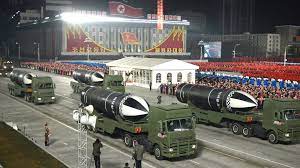United Nations report reviewed by reporters on Saturday revealed that North Korea continued to expand its nuclear and ballistic missile programs last year, and cyberattacks on cryptocurrency exchanges were a major source of cash for Pyongyang.
On Friday evening, independent sanctions monitors delivered their yearly report to the United Nations Security Council’s North Korea sanctions committee.
“Despite no nuclear tests or ICBM (intercontinental ballistic missile) launches,” the researchers observed, “the DPRK continued to expand its capability for producing nuclear fissile materials.”
The Democratic People’s Republic of Korea is North Korea’s official name (DPRK). The United Nations Security Council has long prohibited it from conducting nuclear tests or launching ballistic missiles.
“DPRK’s nuclear and ballistic missile infrastructure maintenance and development continued, and DPRK continued to seek material, technology, and know-how for these programs outside, including through cyber methods and cooperative scientific research,” according to the report.
North Korea has been subject to United Nations sanctions since 2006, which the Security Council has ratcheted up over time in an effort to target money for Pyongyang’s nuclear and ballistic missile programs.
Pyongyang’s missile testing has been “markedly accelerated,” according to the sanctions monitors.
The United States and others stated on Friday that North Korea launched nine ballistic missiles in January, the most in a single month in the country’s history of weapons of mass destruction and missile launches.
The sanctions monitors claimed the DPRK “demonstrated expanded capability for fast deployment, wide mobility (including at sea), and better missile force resilience.”
A request for comment from North Korea’s UN mission in New York was not immediately returned.
ILLICIT TRADE, CYBERATTACKS
North Korean hackers continue to target financial institutions, cryptocurrency firms, and exchanges, the monitors said, adding that “cyberattacks, particularly on cryptocurrency assets, remain a significant revenue source” for the country.
“According to a member state, DPRK cyber actors stole more than $50 million from at least three cryptocurrency exchanges in North America, Europe, and Asia between 2020 and mid-2021,” according to the study.
North Korea launched at least seven attacks on cryptocurrency platforms last year, stealing roughly $400 million in digital assets, according to a report released last month by cybersecurity firm Chainalysis.
North Korea produced an estimated $2 billion for its weapons of mass destruction programs using widespread and increasingly sophisticated cyberattacks, according to UN sanctions monitors in 2019.
According to the newest assessment, North Korea’s rigorous ban in response to the COVID-19 pandemic has largely halted “illicit commerce, particularly in luxury products.”
The United Nations Security Council has restricted North Korean exports of coal, iron, lead, textiles, and seafood, as well as limiting crude oil and refined petroleum product imports, over the years.
“Although coal maritime exports from the DPRK grew in the second half of 2021, they remained low,” the monitors noted.
“The volume of illicit refined petroleum imports climbed substantially in the same period, albeit at a far lower level than in previous years,” according to the report. “Non-DPRK tankers no longer carry oil directly to the DPRK, owing to COVID-19 steps; instead, only DPRK tankers deliver oil.”
The humanitarian situation in North Korea “continues to deteriorate,” according to the report. The monitors said this was most likely due to the COVID-19 blockage, but that a lack of information from North Korea made determining how much UN sanctions were suffering civilians unintentionally difficult.

















